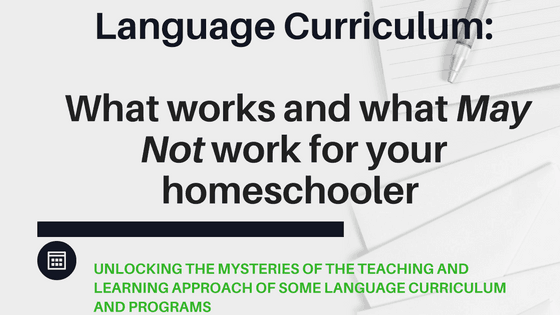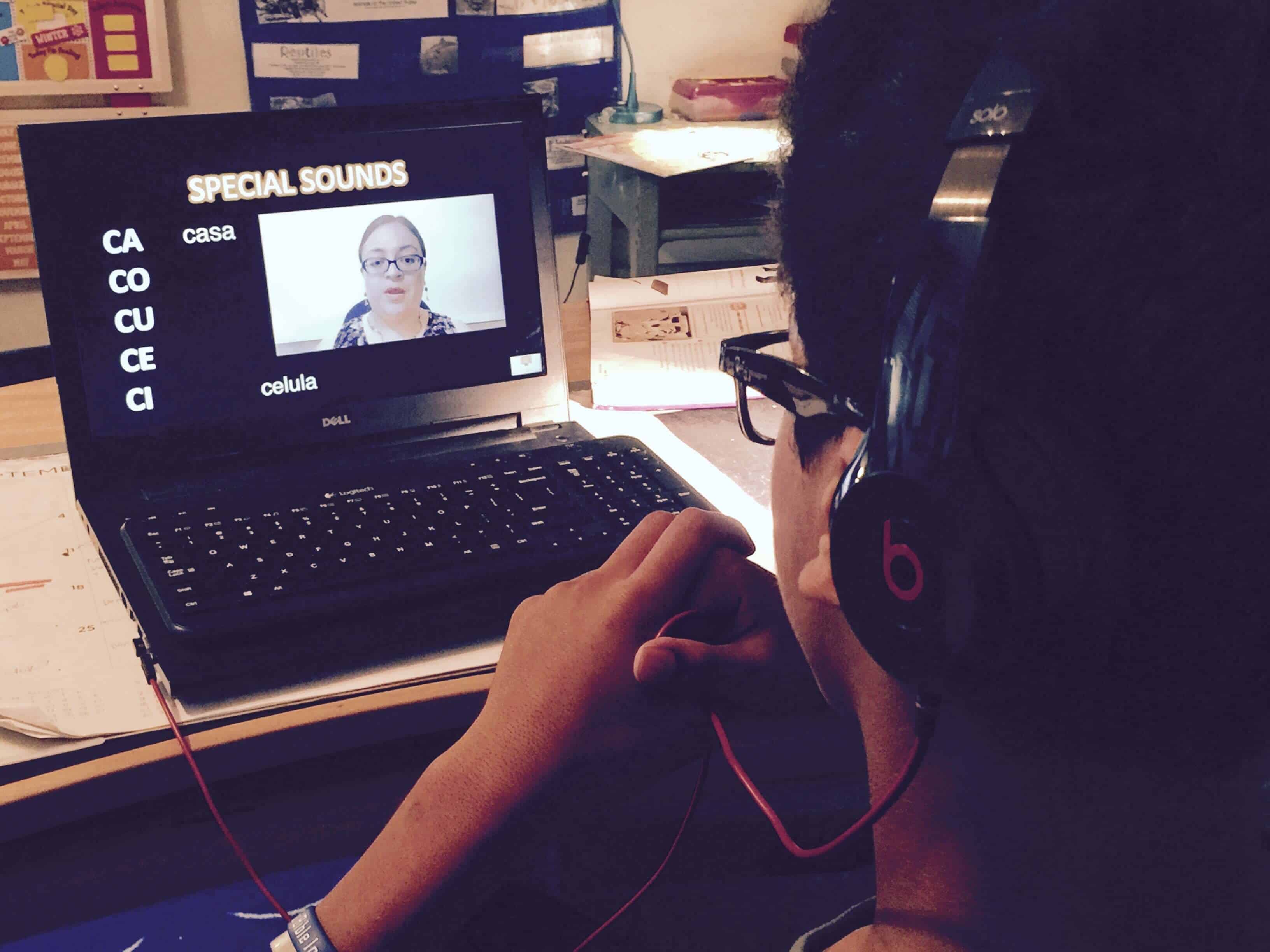Language Curriculum: What Works and What May Not Work for Your Homeschoolers

One of the choices I have to make as the homeschool parent is to decide how my child is going to learn a subject. Many times as parent we become the motivating force behind our child’s learning. Therefore, the curriculum we choose is vital for our child’s learning outcome.
Highlights:
- The use of a foreign language software program and mobile assisted language application (apps) to learn a language.
- The teaching and Learning approach to learn a language.
- Valuable aspects that should be present when learning a language.
The program you choose will impact your child’s language learning experience.

Figure 1. As parents we aim for our children to have a positive and meaningful learning experience
This statement may sound too extreme, but I must say when I talk about learning a language with many parents, the first thing they share with me is their own language experience. The learning methodology of the curriculum and who teaches your child will impact her or his learning experience. As a teacher, the best compliment I receive is when parents and students tells me “we are with you because you are our last resource, we’ve tried everything.”
As a language teacher, I address first the mindset aspect with my new students This is because you do not want any previous negative learning experiences to affect the new one. However, if the previous learning experience was positive, the new one will even better because new concepts will connect with previous foundation.
Therefore, considering what curriculum you will use for the first level of the language is essential. You want to give your child the best learning experience and a good foundation starting for level one. Let’s explore now learning approaches:
Natural Approach:
Students learn vocabulary words; expressions and then they connect them to make sense of the language, Just like a baby will learn communication skills. Computer software such as Rosetta Stone is based on this approach. Many parents use it on primary level and middle/ high school level. Program can be found online or CD-ROM.
Traditional Approach:
Students learn using textbook, workbook and some degree of media to learn the language. Students work independently or with the parent support or in a classroom setting with a teacher. Several curriculum programs use this approach; often I see more the middle and high grades using the approach.
Online Approach:
Students use 100% technology to complete the language program. This method students work independently or with the support of a teacher. Some programs use CD-ROM or on the web. Some are live, or some are self-pace.
A blended approach:
Blended means when teaching and learning happens face to face and at home. Usually use at Homeschool Co-Op types of settings. Mostly use on middle and high school levels. Teacher usually follows a traditional curriculum with combination of technology.
Enrichment approach:
Many homeschool parents use online programs or language applications to enrich the language learning experience. Some examples are Duolingo. There are many excellent resources out that can make learning fun. The main reason students are attracted to this type of learning is because is interactive, gaming style and also the immediate feedback they receive when using the programs. Also the use of colorful workbooks and books to practice vocabulary and skills are a fun way to teach younger children when using this method.
I want to address more in depth the natural approach type of curriculum such as language Software and foreign language apps like Rosetta Stone. The central aspect of the program is to expose students to vocabulary, language expression and some level of grammar depending on the level. Some experts consider this approach a “stand alone program” that cannot promote proficiency[1] or development of the language but is more for the acquisition of the language process. As a Spanish teacher, my goal is always to develop communicative competence in my students. During my 16 years of experience I have observed some students find learning meaningful only when they are learning how to use the foreign language. If you child is learning this way I suggest you will find him or her opportunities where he or she can practice putting the language together; I believe, this will keep and promote a higher level of motivation in his or her learning.
Points to consider when choosing a software program, online program or language app:
Age
Middle and high school ages may find difficult engaging with the program because of the learning approach. Students may find this learning experience repetitive, unattractive and boring. However could be just the right approach for primary years.
Language skills + communication
Some of these programs focus only on some skills such as vocabulary and grammar. To promote language proficiency, you cannot only have the vocabulary and grammar aspects. For your child to be able to form coherent and meaningful communication in authentic or real experiences with the language, it will require others skills and sometimes maybe a language teacher to help the learners put the language together.
Language Teacher or a language tutor
If you are going to use this type of program and you see that your child is not gaining communicative competence consider complementing the learning experience of your child with a language teacher or tutor.
Course Completion
One of the greatest challenges students and homeschool parents face is completing the program. Most of these programs are self-paced, and students are working independently with parent support. Higher levels can be more challenging, and many parents do not know the language. For example, some of the reviews I read about Rosetta Stone is that some of the worksheets and tests that go along with the program are hard to understand. Some parents and students need to use Google translator to figure out what the content of worksheets is about. Eventually, some parents stated that they gave up.
Technological and technical part
I was surprised to read so many negative reviews about these two aspects. For this reason, I decided to include the information. For example, the Rosetta Stone program allows students to pronounce the words. However, some homeschool parents stated that there seems to be an issue with the use of the microphone. One mother told me even though she speaks Spanish and she consider herself a native speaker she tried pronouncing the words several times and she could not get the software to accept the answers. Hopefully, the company is taking care of that issue and making it user-friendly.
Schedule
Most programs are self-paced and many students decide to work independently. Therefore, the program will require supervision from the parents and discipline from the students. For the learning to happen the students needs to see it as part of the daily and weekly schoolwork. My suggestion is to write the days and times when the learning needs to happen to make sure students complete the course on time. Help your child set clear goals and expectations.
What about the other learning approaches?
There is not a perfect program or learning approach just like there are not perfect students. As a homeschool mother, I have used many different approaches to get the results I wanted for my kids. However, let’s consider the following aspects:
Homeschool Co-Op/ Blended Learning
I teach three classes on a Co-Op and I have witnessed the learning benefits of my students meeting with me once a week face to face and then learn and work the rest of the week independently through an online learning system. Co-Op teachers usually follow a language curriculum and they take care of the language education such as testing and assessing student’s progress. Your role as the parents is more to monitor the student’s work and progress at home.
Online courses
I am still amazed how technology has changed the way we learn today. When I started teaching Spanish sixteen years ago, I never thought in my wildest imagination that I was going to be able to teach Spanish to students all over the country and do it 100% online. When I went back to school to work on my MBA I was very skeptical about this approach However, I must say now I believe it’s is possible to learn online and have a great learning experience. If your child is going to learn a language online make sure the language courses promote communication not only on a few skills but look for a complete approach. I recommend you to look for a course that involves teacher- student- content- other student’s interactions for a rich learning experience.
Role of a language teacher:

Education does not only include head knowledge and information. Learning a language also has an emotional and social aspect. I still experience that with my son. He was not that excited to learn Spanish for a few years. We speak only Spanish at home after 3:30, so he understands everything we say. However, I wanted him to take formal Spanish courses, so this year he joined the Co-Op where I teach, he is currently working on Spanish 1.Kaleb is a different student this year. He is working and engaging more; it is not mama asking for the homework anymore but it his Co-Op teacher. I also observe the attitude of my online students, every week they are eager to hear the interaction between their other classmates and speak with me when we meet for live speaking classes. My point is that, sometimes, a teacher may be a very positive experience for your child, he or she may be able to experience realistic and authentic language situations that can help him or her make more sense of the language and engage more.
Advice for Primary Years Parents:
During these years YOU probably are the one that plays the role of teacher. I have a six-year-old learning Spanish and the way I approach her language learning is very different than my 7th grader. As the parent-teacher you can take care of the emotional and social aspect of the learning by finding a good program that you may be able to work together and have fun! If you have not read my previous post about how to teach, primary years make sure you check it out. You can read bilingual books, sing songs, and download fun apps. The earlier you start the better prepare your child will be to learn the language in the future.
I hope I was able to transmit some ideas and value information to you. I did not write this post to debate, which is the best curriculum to use to learn a language or what approach, but I wrote it to give you ideas and some guidance so you decide what is best for your child.. If you would like to keep the conversation going, please participate in the post and leave your comment.
Do you want to know what your middle or high school child should be learning during the first year of Spanish 1? Request your guide:
Click Here to Subscribe to receive your Guide: First Year of Spanish- What to expect.
Disclaimers
- Recommendations - I have not tried every single foreign language curriculum that is out there. However, I am using my teaching experience, research and parents and students input for some of my conclusion and recommendations.
- Keep in mind your child’s learning style - I want to remind you to keep in mind your child’s learning style when choosing a program, one program does not fit all.
- Keep in mind the learning goals - why your child is studying the language when making language curriculum decisions.
- I tried my best to maintain the information as objective as possible. I do have a Spanish curriculum, and I am still developing the curriculum based on years of research and my teaching experience. However, by no means I am saying that my curriculum is the only way, I am aware that are many excellent programs out there that can work wonderfully for homeschool families but the very same programs may not be working for others.
Notes:
[1] LORD G. 'I don't know how to use words in Spanish': Rosetta Stone and Learner Proficiency Outcomes. Modern Language Journal [serial online]. June 2015;99(2):401-405. Available from: Teacher Reference Center, Ipswich, MA. Accessed November 21, 2016.







WOW! I never saw your first article, but this is phenomenal! So in depth and well structured with all of the info and topics so well organized! Definitely the best I've read anywhere.
Tabatha, Gracias! I really appreciate you taking the time to read my post. Here is the previous one: https://homeschoolbase.com/choosing-homeschool-spanish-curriculum/#comment-822
Hasta luego,
Sra. Morato